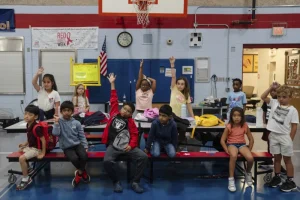More than 20 states sued US President Donald Trump’s administration on Monday over billions of dollars in frozen education funding for after-school care, summer programmes, and more.
Some of the withheld money funds after-school and summer programming at Boys & Girls Clubs, the YMCA or public schools, attended by 1.4 million children and teenagers nationwide. Congress set aside money for the programmes to provide academic support, enrichment, and childcare to mostly low-income families.
But Trump’s administration recently froze the funding, saying it wants to ensure programmes align with the Republican president’s priorities, reports AP.
Led by California, the lawsuit alleges withholding the money violates the Constitution and several federal laws. Many low-income families will lose access to after-school programs if the money is not released soon, according to the suit.
In some states, school restarts in late July and early August. The Department of Education did not immediately respond to a request for comment.

In Rhode Island, the state stepped in with funding to keep the summer programmes running and the state has joined the federal lawsuit. Other Boys & Girls Clubs supported by the grants have found ways to keep open their summer programmes, said Sara Leutzinger, vice president for communications for the Boys & Girls Club of America. But there is not the same hope for the after-school programming for the fall.
Some of the 926 Boys & Girls Clubs nationwide that run summer and after-school programmes stand to close if the Trump administration does not release the money in the next three to five weeks, Leutzinger said. The clubs receive funding from the federal 21st Century Community Learning Centers programme.
The YMCA and Save the Children say many of the centres they run are also at risk of shuttering.
Schools in Republican-led areas are particularly affected by the freeze in federal education grants. 91 of the 100 school districts that receive the most money per student from four frozen grant programmes are in Republican congressional districts, according to an analysis from New America, a left-leaning think tank.
Republican officials have been among the educators criticising the grant freeze.
In North Carolina, about 40 schools are already in session, so the state is already trying to figure out ways to keep programmes going, using state and local money, along with some federal money that has not expired.
The freeze affects programmes including mental health services, science and math education, and support for students learning English, North Carolina Attorney General Jeff Jackson said, with the most severe effects in smaller, rural school districts. The freeze could also lead to approximately 1,000 teachers and staff being laid off, Jackson said.


